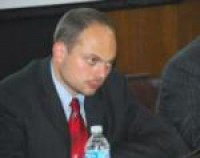https://www.washingtonpost.com...
Opinion by
Vladimir Kara-Murza
Global Opinions contributor
It’s scary to not be able to breathe. That was the first thing I felt, both times the poisoning symptoms began to set in. Both times were in Moscow — the first, on May 26, 2015; the second, on Feb. 2, 2017. My chest was expanding, all the normal physical motions were there — but it felt as if I were suffocating. The other symptoms — racing heartbeat, excessive perspiration, violent vomiting, loss of consciousness — came later.
The official diagnosis from the hospital was “toxic action by un undefined substance” — meaning, in plain language, poisoning by an unknown source. Multiple organ failure, brain swelling and a prolonged coma followed. Both times, doctors told my wife I had about a 5 percent chance to live.
I did, thanks to the amazing Russian doctors, and am deeply grateful to be able to write these words. But this Thursday, I relived a horrific “groundhog day” at hearing the news of Alexei Navalny’s suspected poisoning in Siberia, where he had been canvassing for his movement’s candidates in the upcoming local elections. The opposition politician and Russia’s most prominent anti-corruption campaigner began to feel sick on his return flight to Moscow, perspiring and shouting with pain. After the plane made an emergency landing in Omsk, Navalny, already unconscious, was taken to the local hospital and attached to a ventilator. No official diagnosis has yet been pronounced, but no one in Russia doubts the cause of his sickness.
Time after time, people who crossed the Kremlin’s path have fallen victim to mysterious poisoning attacks: opposition politicians and independent journalists, Russians and foreigners, on our own soil and abroad.
Some, like Ukrainian presidential candidate Viktor Yushchenko, were “lucky” to escape with a disfigured face but alive. Others were not as fortunate. In the summer of 2003, Russian investigative journalist and opposition lawmaker Yuri Shchekochikhin died in horrible pain after his organs gave up one by one and the skin peeled off his body. His medical records were sealed.
Other victims of suspected poisoning include crusading journalist Anna Politkovskaya, opposition activist and performance artist Pyotr Verzilov; former Canadian justice minister Irwin Cotler; and former Russian security service operatives Alexander Litvinenko and Sergei Skripal. (Both Litvinenko and Skripal were attacked on British soil; Skripal survived, Litvinenko did not.)
Apart from its sadism — excruciating pain and, in case of survival, lasting health effects and a long and difficult road to rehabilitation — this method gives the authorities plausible deniability. Every time, Kremlin spokesmen shrug their shoulders and deny any involvement. “Where is your proof?,” ask regime officials and their Western apologists — a question designed to have no answer because proof should come from investigations Russian authorities refuse to conduct.
Yet proof is possible to obtain. After my second poisoning in February 2017, my wife managed to get an early blood sample and took it to the FBI’s toxicology lab in the United States, reportedly the best in the world. As Sen. John McCain (R-Ariz.) wrote to FBI Director Christopher Wray, “identifying how this was done … will provide a small form of protection against repeated attacks on his life and that of other dissidents.”
The tests were conducted, and results presumably obtained. But then they were classified: sealed from me, from inquiring members of Congress and from journalists. The only remaining option was going to court — and I did, with help from attorney and former senior national security official Stephen Rademaker. The documents — more than 400 pages of them — must be handed over by the FBI to the U.S. District Court for the District of Columbia by Oct. 15. But this will be too late to prevent what happened to Alexei Navalny.
I hope and pray that he lives. If he does, I know he will continue his work against Vladimir Putin’s corrupt system to help one day make Russia, in Navalny’s own words, “a normal European country.” Meanwhile, it is important to keep international attention on his case. It is much easier to commit a crime in silence than in the spotlight; I am living testimony to that. A strong stance from world leaders, on both sides of the Atlantic, will help ensure that the Russian authorities allow Navalny’s doctors to do their job.
Once the immediate crisis passes, there should also be long-term consequences. Under Putin, the perpetrators of attacks on opposition leaders — including, most prominently, the assassination of Boris Nemtsov in plain sight of the Kremlin, 2,000 days ago this week — will continue to be shielded from the highest level. But Putin will not be in power forever. For now, in the West, there should be no more talk of new “resets” with a regime that speaks with its opponents in the language of bullets and poison.
The world must pay attention to the suspected poisoning of Alexei Navalny. My own case shows why.
Rahvusvahelised uudised | 22 Aug 2020 | EWR
Rahvusvahelised uudised
TRENDING

























